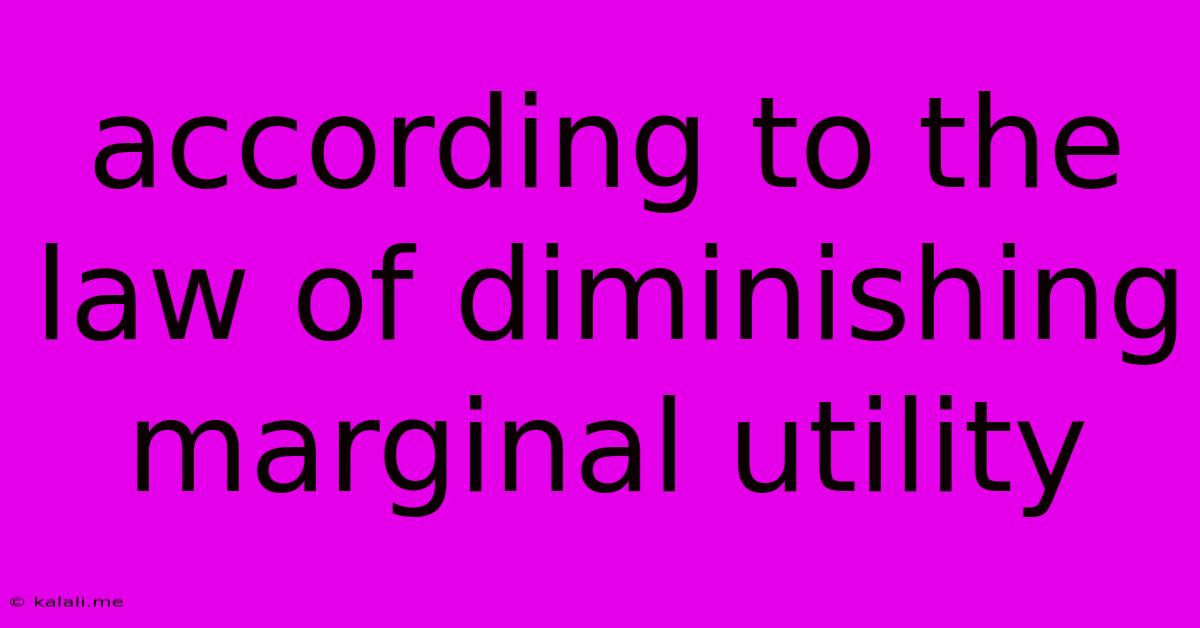According To The Law Of Diminishing Marginal Utility
Kalali
Jun 16, 2025 · 3 min read

Table of Contents
Understanding the Law of Diminishing Marginal Utility: Why Your Second Slice of Pizza Isn't as Good as the First
The Law of Diminishing Marginal Utility is a fundamental concept in economics explaining how the satisfaction derived from consuming something decreases with each additional unit consumed, all other things being equal. This seemingly simple principle has profound implications for consumer behavior, pricing strategies, and overall market dynamics. In this article, we'll delve into the details, exploring its meaning, real-world examples, and exceptions.
What is Marginal Utility?
Before understanding diminishing marginal utility, we need to define marginal utility. Marginal utility refers to the extra satisfaction or benefit a consumer receives from consuming one more unit of a good or service. Think of it as the additional happiness you get from that second slice of pizza, compared to the happiness you felt after eating the first.
The Law in Action: Diminishing Returns on Satisfaction
The Law of Diminishing Marginal Utility states that as a consumer consumes more and more units of a good, holding all other factors constant (like income and the prices of other goods), the additional satisfaction derived from each extra unit consumed will eventually decline. That first slice of pizza is amazing, the second is still good, but the third might start to feel a bit heavy, and by the fifth, you're probably feeling quite full and the extra satisfaction is minimal or even negative.
This isn't just about food. Consider these examples:
- Watching Movies: The enjoyment of watching a movie might be high, but watching five movies in a row might lead to diminishing returns. Your enjoyment level will likely decrease with each additional movie.
- Buying Clothes: The thrill of buying a new outfit is significant. However, buying multiple identical outfits will provide decreasing marginal utility with each purchase.
- Playing Video Games: The excitement of a new video game is palpable. But playing for 12 hours straight will likely lead to fatigue and diminished enjoyment.
Why Does Diminishing Marginal Utility Occur?
Several factors contribute to the law's effects:
- Satiation: As you consume more of a good, your needs are progressively satisfied. The extra units offer less value as your initial needs are met.
- Substitution Effect: With increased consumption, consumers may find substitute goods more appealing. The enjoyment of pizza might diminish as the desire for a salad becomes stronger.
- Psychological Factors: The novelty of a product wears off. The initial excitement is replaced by routine and diminishing pleasure.
Exceptions and Limitations:
While the Law of Diminishing Marginal Utility is a powerful concept, it's not without exceptions:
- Addiction: Addictive substances often defy this law; the marginal utility might increase with consumption, leading to harmful compulsive behavior.
- Collectibles: The value of certain collectibles, like rare stamps or art, may increase with each additional item acquired. This is due to factors beyond pure consumption utility.
- Learning and Skill Development: The marginal utility of learning a new skill may increase initially due to accumulating knowledge and expertise.
Implications for Businesses and Consumers:
Understanding this law has important implications for businesses and consumers:
- Pricing Strategies: Businesses can use this principle to set prices strategically. Offering discounts on bulk purchases might compensate for the diminishing marginal utility experienced by consumers.
- Product Differentiation: Businesses aim to create products with unique features to maintain higher marginal utility across multiple purchases.
- Consumer Choices: Consumers can make informed purchasing decisions by considering the diminishing returns on their spending.
In Conclusion:
The Law of Diminishing Marginal Utility is a cornerstone of economic theory, providing valuable insight into consumer behavior. While it has limitations and exceptions, its understanding is vital for analyzing market dynamics, pricing strategies, and individual consumer choices. Understanding how satisfaction decreases with increased consumption allows for better decision-making, both for businesses and individuals.
Latest Posts
Latest Posts
-
How To Create Clickable Image In Html
Jun 16, 2025
-
What Are The Factors Of 121
Jun 16, 2025
-
What Is A Theme Of The Passage
Jun 16, 2025
-
A Company That Provides Access To The Internet
Jun 16, 2025
-
Which Word Is Closest In Meaning To The Underlined Word
Jun 16, 2025
Related Post
Thank you for visiting our website which covers about According To The Law Of Diminishing Marginal Utility . We hope the information provided has been useful to you. Feel free to contact us if you have any questions or need further assistance. See you next time and don't miss to bookmark.